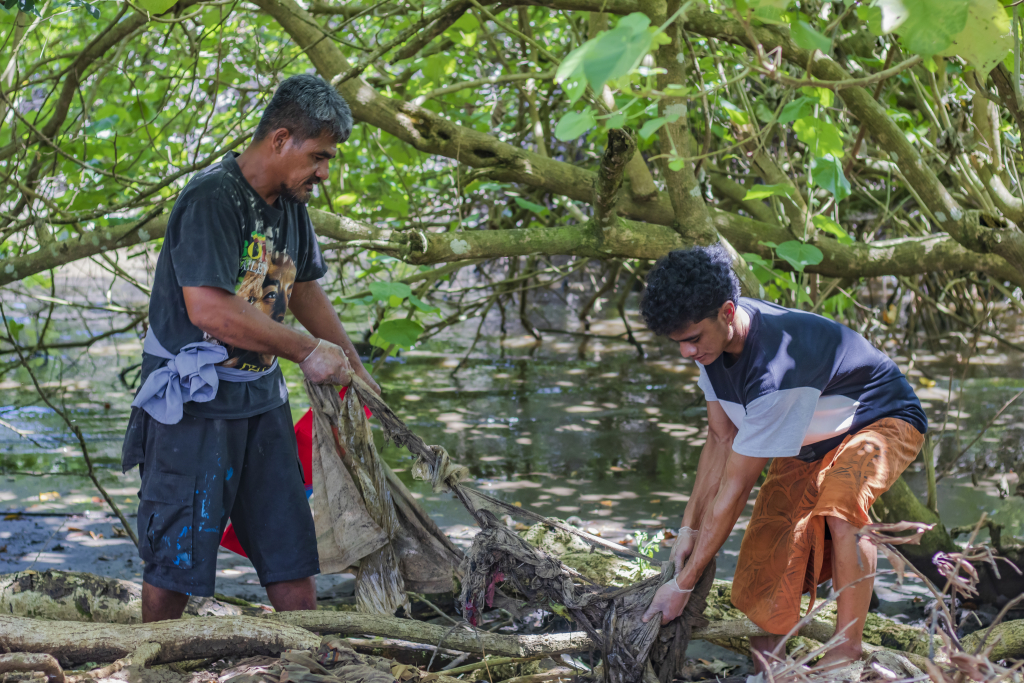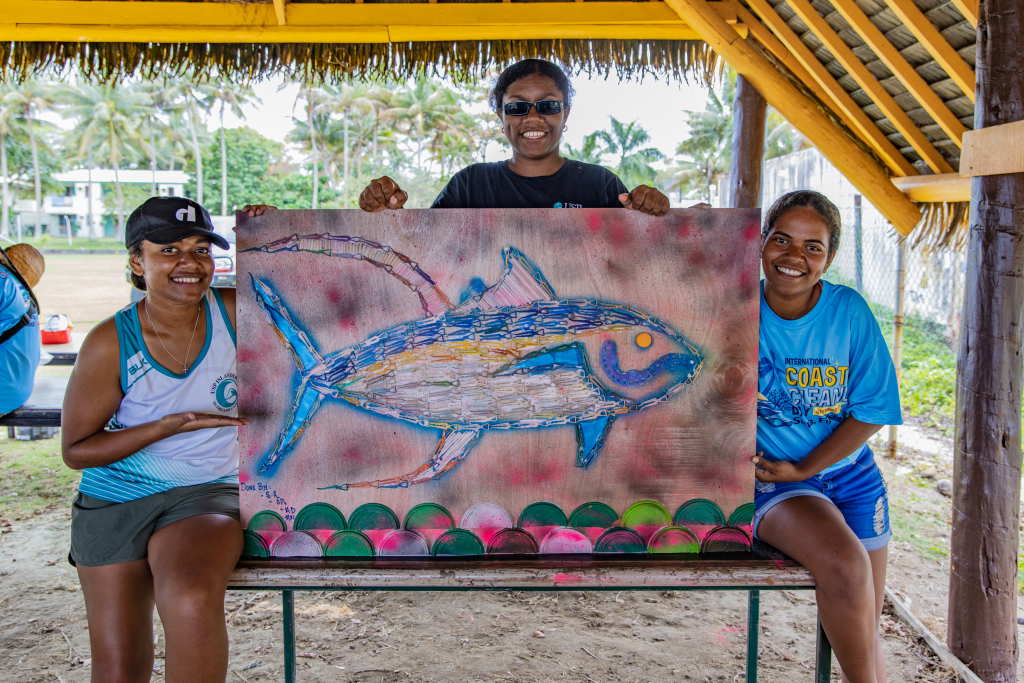
24 January 2023, Apia Samoa - The scale and rapidly increasing volume of marine litter and plastic pollution is putting the health of all the world’s oceans and seas at risk. Despite current initiatives and efforts, the amount of plastics in the ocean has been estimated to be around 75-199 million tons.
This is according to the ‘Global Assessment of Marine Litter and Plastic Pollution-From Pollution to Solution’ conducted by the United Nations Environment Programme in 2021, warning that marine litter is a global, intergenerational and transboundary issue that negatively affects the environment, people and coastal economies around the world.
The Pacific islands are extremely vulnerable to the impacts of marine litter, due to the particular value and sensitivity of their coastal environments.
Working to support our Pacific islands to ensure a healthy and sustainable environment, the Secretariat of the Pacific Regional Environment Programme (SPREP), for the second year, was engaged in the International Coastal Clean Up Day 2022 (ICCD2022).
The event is the single largest coastal clean-up day in the world, and 2022 marked the 36th year of the ICCD in action. Thus, as part of a collaboration between the Committing to Sustainable Waste Actions in the Pacific (SWAP) Project, funded by the French Development Agency (AFD), the Pacific Ocean Litter Project (POLP), funded by the Australian Government, and the Pacific Ocean Acidification Programme, funded by the Korea Institute of Ocean Science and Technology, SPREP supported 24 communities to conduct clean-up actions.

More volunteers participated in the ICCD2022 SPREP-funded regional activity, compared to 330 volunteers in 2021. Two thousand volunteers from six Pacific Islands took part, namely Cook Islands (1 activity), Fiji (4 activities) Samoa (4 activities), Solomon Islands (11 activities), Vanuatu (1 activity) and Wallis-and-Futuna (3 activities). They collected 9.1 tons of waste along 35 beaches and coastal areas, including fabrics and textiles (23% in terms of weight), plastic (19%), metal (19%), glass and ceramic (9%) and other items (e-waste, rubber, paper, etc.).
Mr Leon Labuga, Officer of the Ministry of Environment, Climate Change, Disaster Management and Meteorology in the Solomon Islands, said he was pleased to have been able to contribute to the global effort to keep the Pacific clean.
“Honiara City is one of the dirtiest cities in the Pacific and I am passionate about cleaning and create behavioural change in Honiara,” he said. “Waste collected specifically in the Karaina Coastline Area included items that are made from plastic, metal, glass and ceramic, rubber and other. The data collection revealed that over 500kg of waste was collected. These findings highlight the necessity to keep our ecosystems healthy and the importance of supporting local initiatives”.
The Clean-Up day did not only help to remove waste but was also highly valuable for the improvement of waste management in the Pacific Region: for each clean-up activity, data was collected through a statistically sound waste survey and audit using the United Nations methodology.
The main objective was to outline types and quantity of waste but also to record and share this data on the Litter Intelligence online platform developed by the New Zealand based charity Sustainable Coastlines.
The aim of the programme is to collect and share information about marine litter, but also to use it as a tool for public awareness and decision making by authorities.
The SPREP-funded Regional Event was to encourage the communities to advocate for awareness and conservation in the Pacific Region. At a minimum, each organisation produced a short video about the event to highlight the need to address marine litter.
Some organisations went further by hosting specific awareness activities. For example, prior the clean-up campaign that took place at Mataniko River Mouth in Honiara City, an awareness programme was delivered a week earlier and had integrated the Chung Wah School and Renlau Community in the clean-up to educate attendees about waste management. The aim was “changing of behaviour so that we can disposed of rubbish at the right place,” said Mr Joseph Aropo, Chung Wah Environmental Teacher.
Other initiatives included Rubbish based Artwork Activities as a tool for awareness raising. As such, the Pacific Ocean Litter Youth Project (POLYP) & Suva Harbour Foundation in Fiji produced beautiful art pieces using materials collected during their clean-up activity.

If you wish to discover the actions carried out by the participating associations during the International Coastal Clean-up Day 2022, please visit the SPREP YouTube Channel: https://www.youtube.com/user/sprepchannel.
SWAP aims to improve sanitation, environmental, social and economic conditions in Pacific Island Countries and Territories through proper waste management”. The seven SWAP Pacific islands are Fiji, French Polynesia, Samoa, Solomon Islands, Tonga, Vanuatu, and Wallis and Futuna. New Caledonia will also receive technical support through SWAP.
The Committing to Sustainable Waste Actions in the Pacific (SWAP) Project is funded by the Agence Française de Développement (AFD) https://www.afd.fr/ and executed by the Secretariat of the Pacific Regional Environment Programme (SPREP) https://www.sprep.org/ .
Agence Française de Développement (AFD) implements France’s policy on international development and solidarity. Through its financing of NGOs and the public sector, as well as its research and publications, AFD supports and accelerates transitions towards a fairer, more resilient world. It also provides training in sustainable development (at AFD Campus) and other awareness-raising activities in France.
« With our partners, we are building shared solutions with and for the people of the Global South. Our teams are at work on more than 4,000 projects in the field, in the French Overseas Departments and Territories, in 115 countries and in regions in crisis. We strive to protect global public goods – promoting a stable climate, biodiversity and peace, as well as gender equality, education and healthcare. In this way, we contribute to the commitment of France and the French people to achieve the Sustainable Development Goals (SDGs). Towards a world in common. »
For further information please contact Ms Julie Pillet, SWAP Coordinator at [email protected]
Note: This story has been developed with the support of the University of Newcastle (Australia) as part of a partnership between SWAP and the University through Work Integrated Learning. As such, the SWAP coordinator acknowledges all the students involved in this collaboration, including Mrs. Kayla Koulis for this article.